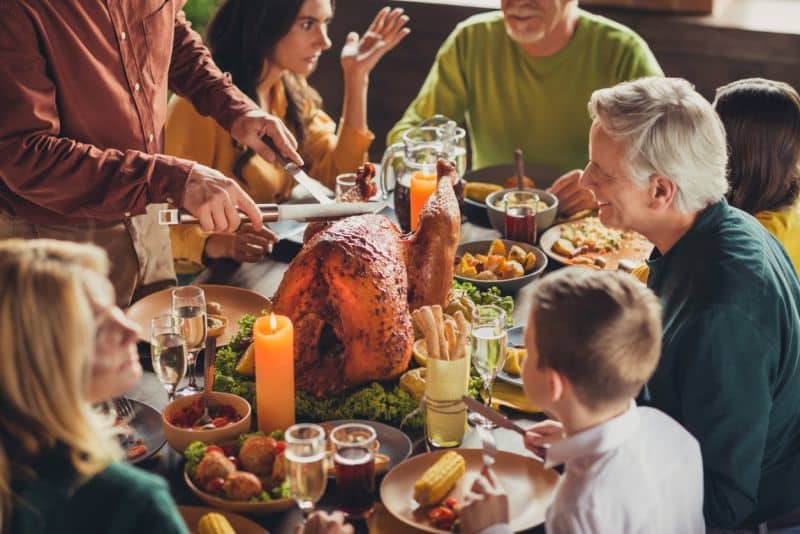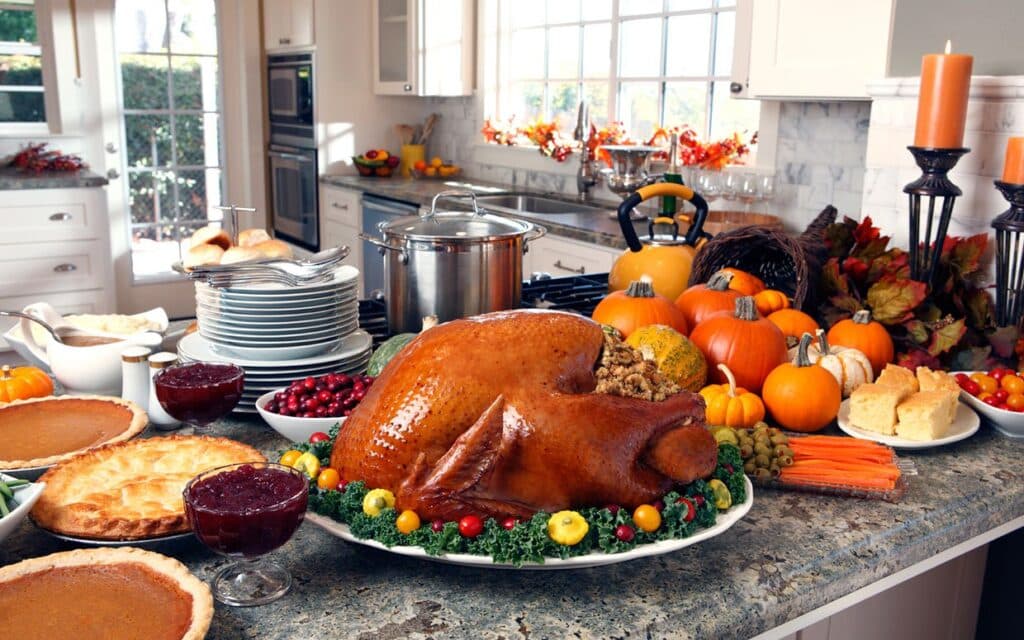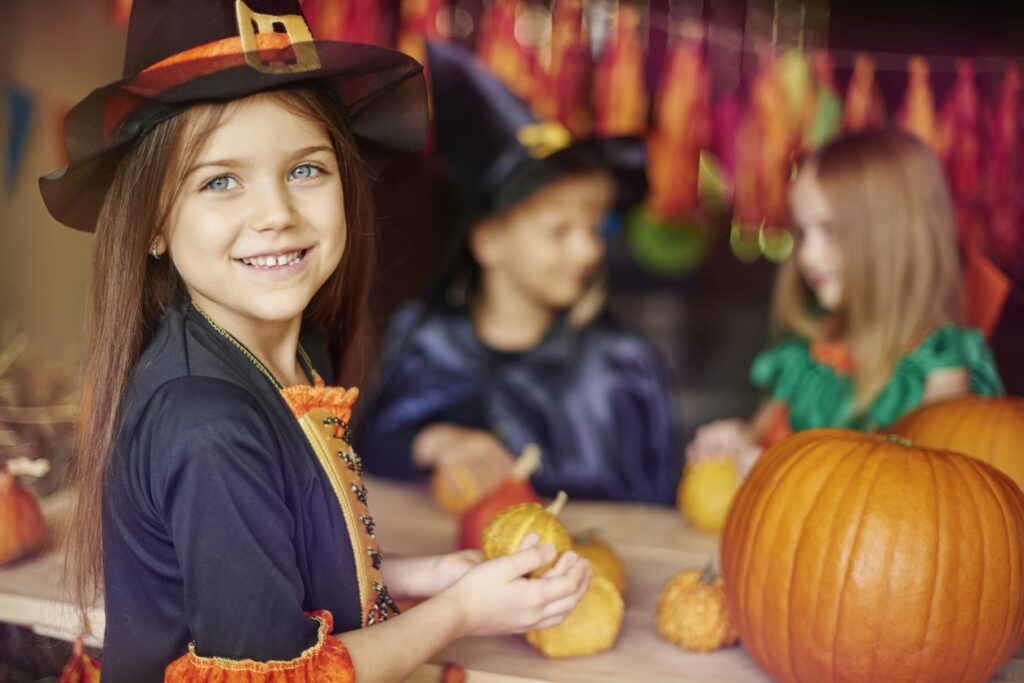The language of Thanksgiving
This popular holiday is known for food, family, and football, but it’s also a holiday with its own unique set of vocabulary words that can be used to describe everything from the foods on the table to the celebratory festivities. Many Thanksgiving words have surprising meanings and origins. Read through this word list to brush up on your Thanksgiving vocabulary.

1.bounty
Bounty means “a generous gift.” It’s a synonym of abundance, which is a central theme of the modern Thanksgiving celebration. Many see the holiday as an opportunity to reflect on and appreciate the bounty of food, friends, and family they’re grateful to have surrounding them. Bounty is frequently used to refer to gifts from nature or from God, rather than simply gifts from another person. The first recorded use of bounty took place in the 1200s, and it comes from the Latin bonitās, meaning “goodness.”
2.cornucopia
A cornucopia overflowing with pumpkins and other vegetables is one of the more popular images associated with Thanksgiving. In classical mythology, a cornucopia is “a horn containing food, drink, etc., in endless supply, said to have been a horn of the goat Amalthaea.” Cornucopias are associated with Thanksgiving because they’re symbols of abundance. The word cornucopia was first recorded in English in the late 1500s from the Late Latin cornū cōpiae, meaning “horn of plenty.”
3.turkey trot
These days, it’s common for a 5K race that takes place on the morning of Thanksgiving to be called a Turkey Trot, but did you know the turkey trot is actually a dance? The term turkey trot is an Americanism that dates back to the 1830s, and it refers to a dance done by couples to ragtime music that involves “a springy walk with little or no bending of the knees, and accompanied by a swinging motion of the body with shoulder movements up and down.” The dance was most popular during World War I, but it is likely to revive as a holiday TikTok dance trend.
4.gourd
Few things symbolize fall quite like a gourd. The word gourd can be used to describe “the hard-shelled fruit of any of various plants,” though it’s vital to note that a gourd is not the same thing as a squash. Pumpkins, zucchini, and butternut squash are all types of squash. Gourd typically describes decorative varieties of squash that aren’t eaten. The word gourd dates back to the end of the 13th century.
5.drumstick
Some people battle with their relatives over who gets the turkey drumsticks on Thanksgiving. Drumsticks, as in “the meaty leg of a chicken, duck, turkey, or other fowl,” get their name because of their resemblance to an actual drumstick, or “a stick for beating a drum.” The word drumstick has been used to describe the legs of cooked fowl since at least the late 1600s.
6.pie
Pie is, of course, “a baked food having a filling of fruit, meat, pudding, etc., prepared in a pastry-lined pan or dish and often topped with a pastry crust.” Not only is it a beloved food, but it also has a pretty interesting etymology. The word pie is thought to be related to the Latin pica, which means “magpie,” possibly in relation to the bird’s habit of collecting miscellaneous objects.
7.Friendsgiving
In recent years, Friendsgiving has grown in popularity as “a gathering of friends to celebrate Thanksgiving with a feast, falling near or on Thanksgiving Day.” Since many people travel to visit family for Thanksgiving, Friendsgiving is a way to connect with dear friends who may not be near on the actual Thanksgiving holiday. The term has grown in popularity throughout the 2000s and 2010s, thanks to the Internet.
8.turducken
Turkey is the standard Thanksgiving food, but we can’t forget about the legendary turducken. Well, it’s “a deboned turkey that is stuffed with a deboned duck that is stuffed with a deboned chicken.” The word turducken is a portmanteau, a blended word made from the parts of other words. Interestingly, it isn’t the only Thanksgiving main dish alternative that’s also a portmanteau. The word tofurky is a blend of the two words: tofu and turkey.
9.food baby
At the end of Thanksgiving dinner, you might find yourself with a food baby. A food baby is “the bloated appearance of the stomach area after eating a large amount of food, giving the person the appearance of being pregnant.” In other words, you might say you have a food baby when you’re feeling very, very full. It’s been in use—on Thanksgiving and during any other event that involves lots of yummy food—since the late ’90s.
10.the Macy’s (Thanksgiving Day) Parade
The parade has been a Turkey Day staple for the last 94 years, and last year it went totally virtual due to the pandemic. But according to the department store’s announcement, the 2021 Macy’s Thanksgiving Day Parade will be back to the traditional in-person event with giant character balloons, spectacular floats, street performances, and crowds lining the parade route.
“For our 95th celebration, we are delighted to return this cherished holiday tradition closer to its original form as we march down the streets of New York City and into the homes of a nationwide audience,” Will Coss, executive producer of the parade, said. “We are thrilled to welcome back in its full form the Macy’s Thanksgiving Day Parade, a world-renowned celebration that ushers in the magic of being in New York City during the holiday season,” New York City Mayor Bill de Blasio said in the announcement.
sources: Dictionary.com; Macy’s Just Announced the Thanksgiving Day Parade Will be Back This Year, Better Homes & Gardens
interesting info about Macy’s Thanksgiving Parade:
Első alkalommal (1924-ben) a felvonulás a Harlemből, a 145. utcai Macy’s elől indult és egészen a 34. utcában található Macy’s Nagyáruházig haladt. A dolgozók és a felfogadott mulattatók jelmezes felvonulását a Central Park állatkertjéből kölcsönzött állatok, léggömbök és fúvószenekarok tették vidámabbá.
Az első parádé végét a Mikulás bevonulása jelezi (ez azóta is a hagyomány része maradt). Az elsöprő sikert miatt a Macy’s vezetősége úgy döntött, hogy minden egyes évben megrendezik az ünnepséget. 1927-ben hivatalossá vált a tradíció, melyet azóta Emmy díjjal is jutalmaztak.
1927-ben az élő állatokat hatalmas lufi figurákkal helyettesítették. Az első években, a felvonulás végén a hatalmas lufikat szélnek eresztették. A Macy’s belevarrta a címet és ajándékutalvánnyal jutalmazta azokat, akik megtalálták a léggömböket.
Falloon: a float és a balloon szavak kereszteződéséből jött létre, melyet a föld felett sikló léggömbökre alkalmaznak. Az első falloon-t 1969-ben jelent meg, s a mai napig ez a hatalmas Hálaadás napi pulyka indítja a felvonulást.
Ballonicle: a balloon és a vehicle szavak összevonásával alakult ki. Léggömbök, melyek motorral ellátott járművekre épülnek és a vezető a léggömb alatt található járműben ül.
Énekesek, színészek és hírességek teszik a parádét még vonzóbbá. A Macy’s Nagyáruház előtt felállított színpadon szerepelnek, majd mindannyian egy-egy fallon-on foglalják el a helyüket és köszöntik a parádé útvonala mellett álló közönséget.
source: A Tengerentúlról jelentem – Fedezd fel New York titkait!, tinkmara.com
Válaszd ki a megadott szavak közül, melyikről szól a leírás.
Vocabulary
| unique | egyedi |
| origin | eredet/származás |
| to brush up | feleleveníteni/felfrissíteni 8tudást) |
| generous | bőkezű/nagylelkű |
| abundance | bőség |
| to reflect on | elmélkedni/töprengeni |
| to appreciate | nagyra értékelni/megbecsülni |
| to take place | megtörténik |
| overflowing | bővelkedő/túláradó |
| to contain | tartalmazni |
| horn//cornucopia | szarv//bőségszaru |
| goat | kecske |
| 5K race | 5 kilométeres országúti futóverseny |
| couples | párok |
| springy | ruganyos/rugózó |
| bending | behajlítás |
| to accompany | valamivel együtt jár/kíséri |
| swinging | kilengő/hintázó |
| fall | ősz |
| gourd | tökféle (itt dísztök fajta) |
| drumsticks | (madárféle) combjai//dobverők |
| fowl | szárnyas |
| resemblance | hasonlóság |
| drum | dob |
| pastry-lined pan | tésztával kibélelt tepsi |
| pastry crust | tésztakéreg |
| magpie | szarka |
| in relation to | valamivel kapcsolatban/ valami kapcsán |
| miscellaneous | vegyes/különféle |
| feast | lakoma/ünnepség |
| deboned | kicsontozott |
| portmanteau | vegyülékszó (több szó részeiből alkotott szó) |
| bloated | felpuffadt |
| appearance | megjelenés |
| to involve | magába foglalni |
| yummy | fincsi |
| staple | állandó/nagyon fontos része |
| character balloons | rajz és reklámfigurák lufi változatai |
| to float | lebegni |
| to line | sorban állni/szegélyezni |
| cherished | dédelgetett/kedvelt |
| to be thrilled with | izgatottnak lenni |
| world-renowned | világhíres |
| to usher in | bevezetni |
| mayor | polgármester |







